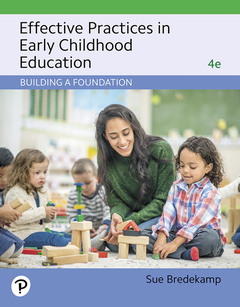Effective Practices in Early Childhood Education (4th Ed.) Building a Foundation
Auteur : Bredekamp Sue

Provide the building blocks for understanding effective practices in early childhood education
Inspired by her own classroom experiences, Sue Bredekamp designed Revel Effective Practices in Early Childhood Education: Building a Foundation to empower a new generation of teachers who can make a difference in children?s lives. An entire chapter introduces readers to developmentally appropriate practices (DAP) for early childhood education. Subsequent chapters are organized according to the NAEYC guidelines, which Bredekamp has co-authored for over 30 years. Building on the DAP framework, Bredekamp focuses on three themes that are essential to quality teaching: intentional teaching, developmentally appropriate curriculum, and evidence-based, effective practices. The 4th Edition introduces a new theme, the importance of developing children?s executive function, self-regulation, and positive approaches to learning. Expanded discussions of ways to support and protect the role of play in children?s education, a completely revised chapter on STEM teaching and learning, and a greater focus on culturally responsive curriculum keep readers up to date on the dynamic field of early education.
Effective Practices in Early Childhood Education, 4th Edition is also available via RevelTM, an interactive learning environment that enables students to read, practice, and study in one continuous experience.
Brief Contents
- Continuity and Change in Early Childhood EducationBuilding on a Tradition of Excellence
- Understanding and Applying Developmentally Appropriate Practice
- Applying What We Know about Children’s Learning and Development
- Adapting for Individual Differences
- Embracing a Culturally and Linguistically Diverse World
- Building Effective Partnerships with Families
- Creating a Caring Community of Learners: Guiding Young Children
- Teaching to Enhance Learning and Development
- Planning Effective Curriculum
- Assessing Children’s Learning and Development
- Teaching Children to Communicate: Language, Literacy, and the Arts
- Teaching Children to Investigate and Solve Problems: Mathematics, Science, and Technology
- Teaching Children to Live in a Democratic Society: Social-Emotional Learning and Social Studies
- Teaching Children to Be Healthy and Fit: Physical Development and Health
- Putting It All Together in Practice: Making a Difference for Children
About our author
Dr. Sue Bredekamp is an Early Childhood Education Specialist from Washington, DC. She serves as a consultant on curriculum, pedagogy, developmentally appropriate practice, and professional development for organizations such as the National Association for the Education of Young Children, Head Start, the Council for Professional Recognition, state departments of education, and universities. Her seminal work on NAEYC’s best-selling publications on Developmentally Appropriate Practice in Early Childhood Programs has had a major impact on the education of young children and teacher preparation for more than 30 years. As NAEYC’s Director of Accreditation and Professional Development, she developed and administered their national accreditation system for early childhood centers and schools and wrote standards for curriculum and assessment and teacher education.
Dr. Bredekamp is a frequent keynote speaker and author of numerous books and articles on professional practice. She has been a visiting lecturer at Macquarie University in Sydney, Australia; Monash University in Melbourne; New Zealand Tertiary College; University of Alaska and University of Hawaii. Dr. Bredekamp holds a Ph.D. in Curriculum and Instruction and an M.A. in Early Childhood Education from the University of Maryland. In 2014, the McCormick Center for Early Childhood Leadership at National Louis University recognized Dr. Bredekamp with its Visionary Leadership Award.
Dr. Bredekamp serves as Chair-Emerita of the Board of HighScope Educational Research Foundation. She served on the National Research Council’s (NRC) Committee on Early Childhood Mathematics which produced a landmark report, Mathematics in Early Childhood: Paths toward Excellence and Equity. She coauthored Learning to Read and Write: Developmentally Appropriate Practices for Young Children and was the content developer and on-air faculty for HeadsUp! Reading, a live satellite television
- Developmentally appropriate practices (DAP) are emphasized throughout the text. Chapters are organized according to the NAEYC’s guidelines to help students gain a strong foundation in DAP. (See Ch. 2, which overviews DAP principles and guidelines; Ch. 6, which discusses the critical role of social, cultural, and linguistic contexts on children's development and learning and how teachers must embrace a diverse society to help every child succeed in school and life; and Part 4, where each chapter demonstrates how the continuum of children’s development influences decisions about curriculum content and intentional, effective teaching strategies for children of different ages.)
- Becoming an Intentional Teacher features help readers understand what teachers are thinking and how and why they select the strategies they do. (See the Easing Transitions through Developmentally Appropriate Practice box in Ch. 3 and the Working in Small Groups box in Ch. 9.)
- Compelling case studies introduce the key points in each chapter. Cases are revisited at the end of the chapter to help students better understand the chapter content and reinforce their learning.
- Observe, Reflect, Apply end-of-chapter features include authentic artifacts of children’s work to bring the classroom experience to life and engage teachers as they practice and apply their skills.
- New - Digital media examples help teachers assess the potential benefits and risks of using technology in their classrooms and understand how to use it in developmentally appropriate ways. (See Chs. 7 and 9-13).
- Explores the classroom implications of current research on brain development and executive function
- Updated - The important theme of developing children’s executive function, self-regulat
Date de parution : 02-2019
Ouvrage de 672 p.
21.6x27.4 cm



